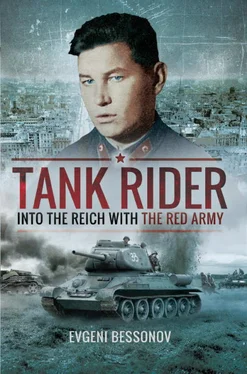In short, on 20 or 21 July, 1944, I summoned the squad leaders and explained the mission, that had been given to me by Captain Kozienko, battalion commander (one month later he became a Major). At dawn I and two platoons of our company, as well as the machine-gun platoon of the 3rd company of our battalion under Lieutenant Tsikanovski, attacked Lvov. The city was built in the western manner, alongside large apartment houses there were individual mansions, surrounded by iron fences or mesh. There were a lot of small crooked, sometimes steep, streets in the city in addition to the wide boulevards.
Trenches could be seen at the outskirts of the city. It was these that we attacked in a line. Just in case I sent one squad (seven or eight soldiers) ahead as a scout party. The scout party reached the trenches and reported that there were no Germans there. I ordered the squad to come out on to the asphalt highway and advance into the city on that highway. I turned the company to the road as well, and we followed our advanced point on the roadsides. This is how we entered the city – ahead of us, some 150-200 metres away, there was the vanguard, and the rest of the company proceeded as two columns of one on the roadsides. Two local men welcomed us. One of them held a tray with glasses, while the other held two bottles of vodka, pouring it into the glasses. Each one of us came up to them had his shot of vodka and marched on. I also did this with thankfulness, I even had two shots. We entered the city from the southern outskirts, along Kultparkovaya Street. To the left of the road there were small houses, one and two storeys high, while to the right there was a wooden fence. We did not encounter enemy, it was quiet as if there were no war, and the sun was at its hottest. But we could in no case be offguard, as we were not waging war against amateurs. On the contrary, we faced well-trained, strong and resourceful soldiers, one could expect anything from them. I warned my soldiers that we had no right to relax because of the small size of our force, which was only armed with two Maxim machine-guns. One of the Maxim crews was under Sergeant Ivan Zakharievich Chechin – a young, brave and selfconfident fighter, with whom I fought side by side till Victory Day.
We did not advance deep into the city but consolidated our position in the empty houses at the city’s outskirts, as the battalion commander ordered it. In any case, we advanced one block into the city. The battalion commander and his staff were stationed in front of the city, but established telephone communication with me. Our kitchen was again absent – it was burnt in an air raid, so I sent soldiers to look for food in surrounding houses. We managed to get hold of some food from the locals – in any case, we did not go hungry. Senior Lieutenant Kashintsev, the commander of the artillery battery of our battalion arrived together with Israel Solomonovich Tsikanovski (we called him Semyon). Kashintsev brought along one 45 mm gun, which was towed by the crew, but it only had a few rounds. The rest of the battery, supply trucks and prime movers were destroyed by the German air force during the march to Lvov.
I liked Kashintsev, sometimes stuttering, but ever cheerful with a sharp mind and a good sense of humour. At that time he was 27 years old. He was an interesting person and a veteran of many previous battles. I was glad that he came. Then Tsikanovski and I had someone to consult with about how to capture a huge city with a company of soldiers. We did not advance deep into the city, I was afraid of entering the maze of narrow streets, which had no shelter and where it was impossible to dig in. We could not advance through the gardens because of high metal fences of private houses. Somehow, there had been more space in Skalat and Kamenets-Podolsk – we had not encountered any fences of that type. We did not have any tanks with us; we would have felt safer with them. Of what use was the 45 mm gun with five rounds? Just a joke. We did not have any information about the enemy, its positions and presence of enemy armour. The battalion commander did not give a detailed mission to us – such as where to advance in the city. He did not bother us, we did not bother him, and that was a mistake.
It was quiet and calm, no one fired at us, the German air force was nowhere to be seen, and we had food. They were warm sunny days. After days of intensive march and battles on the way to Lvov this was bliss to us. We prepared to face the enemy: placed our machine-guns, even put the 45 mm gun into position. We dug trenches by the houses to defend against air raids. We had a schedule for observers and a squad on duty. Tolya Kashintsev and I decided to inspect the nearest houses. I sent two squads ahead to check what was happening in front and to the sides of our street and, without going too deep into the city, interrogate the locals, if any could be found anywhere. So far the city looked dead – locals were nowhere to be seen, some houses were abandoned.
Searching the area, Kashintsev and I found a German hospital, which was stationed in three or four four-storey buildings. As far as we could understand, it was a hospital for mentally ill soldiers. We found some German personnel of the hospital. In broken German I ordered them to feed the patients and take care of them. They understood me and we did not come close to that psychiatric clinic. We had enough things to worry about, while Germans could take care of their mentally ill countrymen without our help.
We inspected several other houses, in a brick one we found the locals, who had gathered in that house from other buildings, more vulnerable to shelling. Our scout party came back, reporting the absence of Germans in the nearest houses. Other soldiers, who volunteered to examine the surrounding area, also came back. They spotted a German airfield close to us, but the enemy had abandoned it. The soldiers brought some food staples – mostly all kinds of canned food.
Night passed well; on the next day we did not receive any instructions from the battalion commander, and we were happy. Of course, we should have entered the city instead of having a rest, but we were exhausted and did not know anything about the enemy. We were all tired from our march to Lvov and especially tired of the enemy’s air force. German pilots strafed low, almost at ground level, firing their machine-guns and raining their bombs on us. They did all they could to prevent our advance, while we could only repel the aircraft with small arms fire. The effectiveness of this fire was the same as the effectiveness of medicine given to the dead. And all of a sudden we were in a quiet place: no shooting, no bombing, no hunger either. It was nice and warm, summer time. It seemed like a resort to us, at least a nice holiday house for us.
The next day a sniper opened fire on us. As soon as someone appeared in an open place, a shot sounded. We could not spot his firing position for a long time. Finally, through binoculars we found out that a sniper had fired from the attic of a five-storey building. Late one afternoon volunteers secretly approached the building and went up to the attic, but the sniper was off and away, while neither I nor my soldiers were quick-witted enough to leave an ambush there. Most likely, he was not even a German, but a Ukrainian or Polish independence fighter on his own. He never reappeared.
Two or three days passed like this, and we were still hanging around in the city’s outskirts. Tsikanovski, Kashintsev and I were not brave enough to assault a huge city with half a company of soldiers – 30 or 35 people. The battalion commander did not bother us and we did not bother him, but all of a sudden company commander Senior Lieutenant Chernyshov arrived. It would have been better if he had never shown up. All he did was cause confusion and mess; later he again disappeared. Chernyshov made a decision to advance to the city centre; we advanced along one of the streets. At that instant a person in civilian dress appeared, who showed a Soviet passport and started to convince Chernyshov to advance faster to the city centre. Despite my admonitions not to trust the guy, he did not agree with me and ordered us to advance. An order is always an order, we had to comply, and we cautiously continued our advance along the street.
Читать дальше












